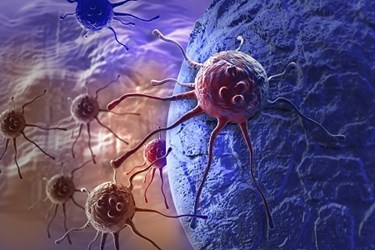Researchers Reveal How Immune System "Sees" Tumors
By C. Rajan, contributing writer

Researchers at the Memorial Sloan Kettering Cancer Centre (MSKCC) in New York have made an important breakthrough in understanding how the body’s immune system recognizes tumor cells, possibly leading to a new generation of improved immunotherapies. The study shows that cancer cells in certain patients have a large number of gene mutations, which help the immune system to recognize and attack the tumor cells.
Cancer Research UK's Dr. Quezada, who was not part of this study, commented on the results, "This is the first time we've had an idea of what the immune system actually 'sees' on a tumor. Until now, it's been hot topic of debate."
In the study, the research team led by Dr. Timothy Chan of MSKCC focused on cancer patients’ responses to a leading immunotherapy drug, ipilimumab (Yervoy, Bristol-Meyers Squibb), used for treating melanoma. Ipilimumab works by stimulating the body’s immune defense against tumors. However, ipilimumab does not work for all patients, and about 80 percent of persons with melanoma do not respond to the drug. Until now, doctors and researchers were unable to predict which patients were more likely to respond to the ipilimumab treatment.
The researchers expected that the reason for this response to the drug lay in the immune system’s recognition of tumors. The team proceeded to analyze cancer DNA from 64 melanoma patients who had been treated with ipilimumab, only half of whom had responded to the drug.
Using sophisticated software, the researchers uncovered a series of genetic mutations in some of the patients, which caused the cancer cells to produce peptide antigens. These short protein molecules helped the immune system to ‘see’ the tumor cells.
The researchers found that drug-responsive tumors share a certain type of mutation that makes tumors express the new antigens, thus triggering the immune system’s reaction. Ipilimumab then enhances the immune reaction and fights the tumors aggressively.
The scientists say that findings could be used to predict which patients would benefit from the highly expensive ipilimumab treatment.
"For the first time, it might be feasible to develop a reliable diagnostic test to help guide treatment decisions by predicting who will respond," said Dr. Timothy Chan.
The findings could also potentially lead to better immunotherapies for melanoma and other cancers. The researchers are planning to investigate whether specific tumor mutations influence the effectiveness of other immunotherapy drugs.
“By mapping the mutations that make different types of tumors sensitive to different drugs, we might ultimately be able to offer more patients successful immunotherapy,” Dr. Chan says. “If we know a patient won’t respond to ipilimumab, we may be able to identify other drugs that are more likely to be effective against this person’s tumor.”
The research is published in the New England Journal of Medicine.
